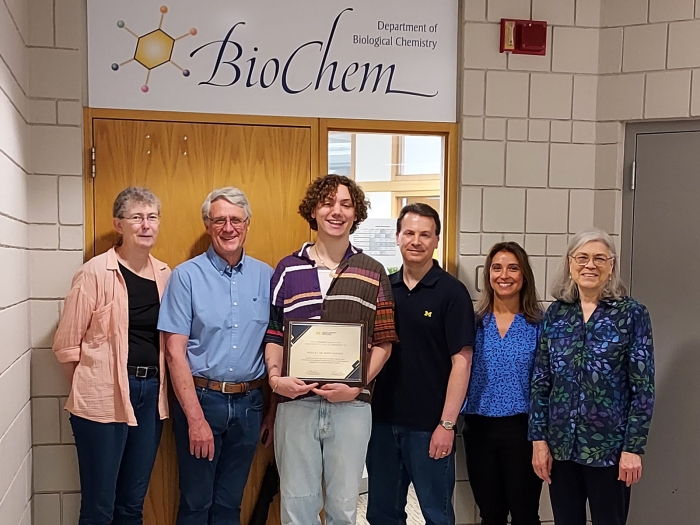
1150 West Medical Center Drive
Ann Arbor, MI 48109
Available to mentor

Our laboratory uses a combination of structural and biochemical approaches to study the structures, mechanisms, and substrate specificities of a variety of enzymes, with a particular focus on histone modifying enzymes.
Trievel Laboratory
-
NIH IRTA Postdoctoral FellowNational Institutes of Health, National Institute of Diabetes and Digestive and Kidney Diseases, 2003
-
PhDUniversity of Pennsylvania, Philadelphia, 2000
-
BSUniversity of Delaware, Newark, 1995
-
Center MemberCaswell Diabetes Institute
1. Structural and Functional Studies of Histone Modifications: Histone modifying enzymes establish and maintain chromatin modifications states that play fundamental roles in governing transcription, DNA damage response, epigenetic gene regulation, and other genomic processes. Our laboratory has characterized the molecular determinants of the substrate specificities of several human histone modifying enzymes, including histone lysine methyltransferases and demethylases, employing structural and biochemical approaches. More recently, we have initiated a new research program aimed at understanding the functions of histone modifying enzymes expressed by bacterial pathogens. Theses enzymes are secreted by the pathogens into host cells where they enter the nucleus and hijack host gene expression by altering histone modifications, thus promoting bacterial replication. Structural and functional characterization of these enzymes from various bacterial pathogens, including Legionella pneumophila, the primary causative agent of Legionnaires’ Disease, is yielding novel insights the molecular basis of their unique histone substrate specificities. Together, these studies are illuminating new aspects of host-pathogen interactions and represent an emerging area of research at the interface of chromatin biology and microbiology.
2. Mechanisms of AdoMet-dependent Methyltransferases: S-adenosylmethionine (AdoMet)-dependent methyltransferases methylate a diverse array of biological substrates, including proteins, nucleic acids, carbohydrates, lipids, cofactors, and hormones. Structural surveys of methyltransferases bound to AdoMet have revealed that the AdoMet methyl sulfonium cation engages in several types of unconventional non-bonded interactions, including methyl carbon-oxygen (CH---O) hydrogen bonding, sulfur chalcogen bonding, and methyl carbon tetrel bonding. The discovery of these unconventional bonds between the AdoMet methyl sulfonium cation and residues and ligands in methyltransferase active sites implicates these interactions in AdoMet binding and the SN2 reaction catalyzed by these enzymes. Using a model lysine methyltransferase and non-reactive lysine analogs, we are investigating the functional importance of these interactions in substrate recognition and catalysis using an interdisciplinary approach combining biochemistry, structural biology, spectroscopy, and computational chemistry. Collectively, these studies are elucidating the mechanisms by which CH---O hydrogen bonding, chalcogen bonding, and tetrel bonding promote AdoMet binding and catalysis in methyltransferases.
-
Odeyemi I, Douglas TA, Igie NF, Hargrove JA, Hamilton G, Bradley BB, Thai C, Le B, Unjia M, Wicherts D, Ferneyhough Z, Pillai A, Koirala S, Hagge LM, Polara H, Trievel RC, Fick RJ, Stelling AL. Spectrochim Acta A Mol Biomol Spectrosc, 2024 Mar 15; 309: 123816Journal ArticleAn optimized purification protocol for enzymatically synthesized S-adenosyl-L-methionine (SAM) for applications in solution state infrared spectroscopic studies.
DOI:10.1016/j.saa.2023.123816 PMID: 38198991 -
Haws SA, Miller LJ, La Luz DR, Kuznetsov VI, Trievel RC, Craciun G, Denu JM. J Biol Chem, 2023 Jul; 299 (7): 104938Journal ArticleIntrinsic catalytic properties of histone H3 lysine-9 methyltransferases preserve monomethylation levels under low S-adenosylmethionine.
DOI:10.1016/j.jbc.2023.104938 PMID: 37331600 -
Gonzalez ME, Naimo GD, Anwar T, Paolì A, Tekula SR, Kim S, Medhora N, Leflein SA, Itkin J, Trievel R, Kidwell KM, Chen Y-C, Mauro L, Yoon E, Andò S, Kleer CG. iScience, 2022 Aug 19; 25 (8): 104827Journal ArticleEZH2 T367 phosphorylation activates p38 signaling through lysine methylation to promote breast cancer progression.
DOI:10.1016/j.isci.2022.104827 PMID: 35992062 -
Ginnard SM, Winkler AE, Mellado Fritz C, Bluhm T, Kemmer R, Gilliam M, Butkevich N, Abdrabbo S, Bricker K, Feiler J, Miller I, Zoerman J, El-Mohri Z, Khuansanguan P, Basch M, Petzold T, Kostoff M, Konopka S, Kociba B, Gillis T, Heyl DL, Trievel RC, Albaugh BN. Proteins, 2022 Mar; 90 (3): 835 - 847.Journal ArticleMolecular investigation of the tandem Tudor domain and plant homeodomain histone binding domains of the epigenetic regulator UHRF2.
DOI:10.1002/prot.26278 PMID: 34766381 -
Abshire ET, Hughes KL, Diao R, Pearce S, Gopalakrishna S, Trievel RC, Rorbach J, Freddolino PL, Goldstrohm AC. J Biol Chem, 2020 Oct 30; 295 (44): 15112 - 15133.Journal ArticleDifferential processing and localization of human Nocturnin controls metabolism of mRNA and nicotinamide adenine dinucleotide cofactors.
DOI:10.1074/jbc.RA120.012618 PMID: 32839274 -
Raiymbek G, An S, Khurana N, Gopinath S, Larkin A, Biswas S, Trievel RC, Cho U-S, Ragunathan K. Elife, 2020 Mar 20; 9:Journal ArticleAn H3K9 methylation-dependent protein interaction regulates the non-enzymatic functions of a putative histone demethylase.
DOI:10.7554/eLife.53155 PMID: 32195666 -
Fick RJ, Horowitz S, McDole BG, Clay MC, Mehl RA, Al-Hashimi HM, Scheiner S, Trievel RC. Biochemistry, 2019 Apr 23; 58 (16): 2152 - 2159.Journal ArticleStructural and Functional Characterization of Sulfonium Carbon-Oxygen Hydrogen Bonding in the Deoxyamino Sugar Methyltransferase TylM1.
DOI:10.1021/acs.biochem.8b01141 PMID: 30810306 -
Trievel RC, Scheiner S. Molecules, 2018 Nov 13; 23 (11):Journal ArticleCrystallographic and Computational Characterization of Methyl Tetrel Bonding in S-Adenosylmethionine-Dependent Methyltransferases.
DOI:10.3390/molecules23112965 PMID: 30428636
